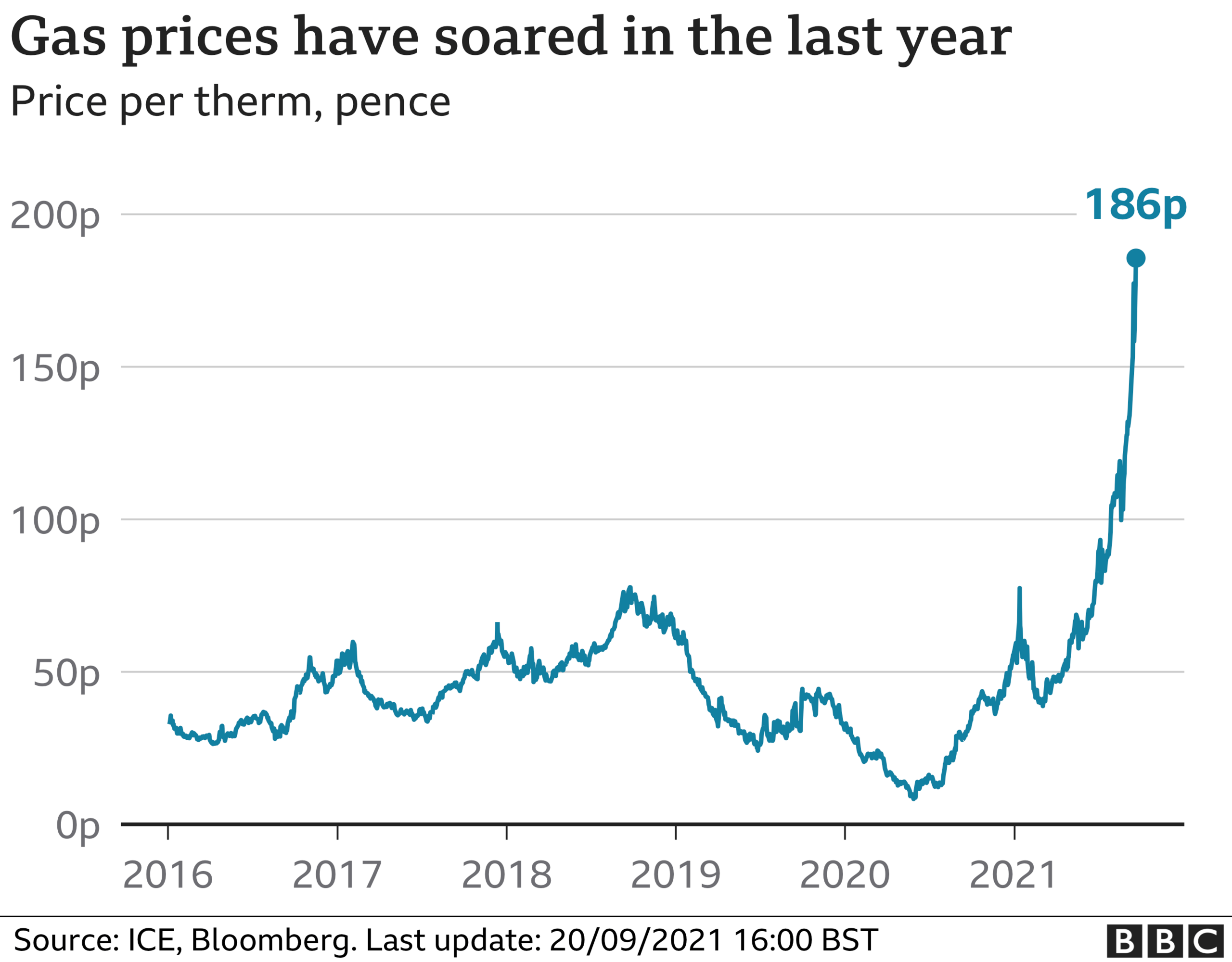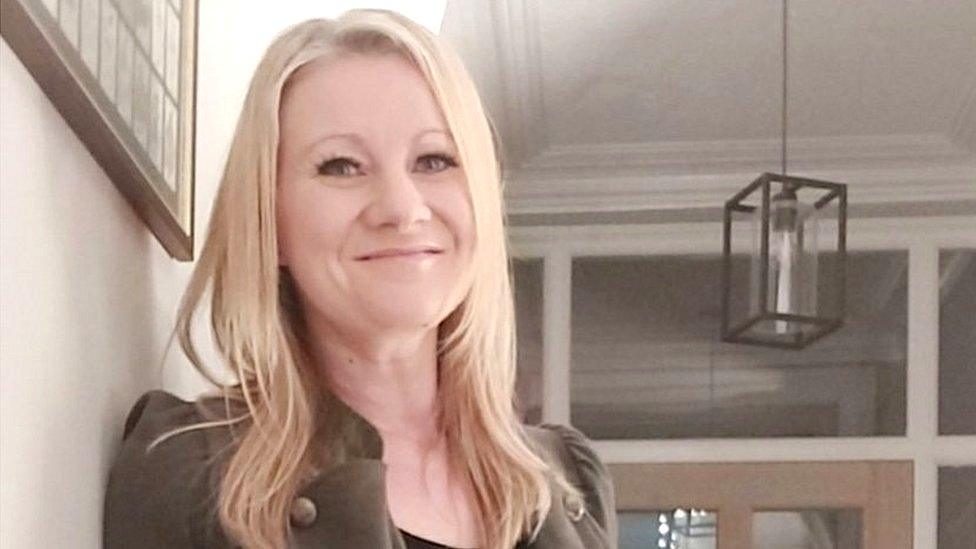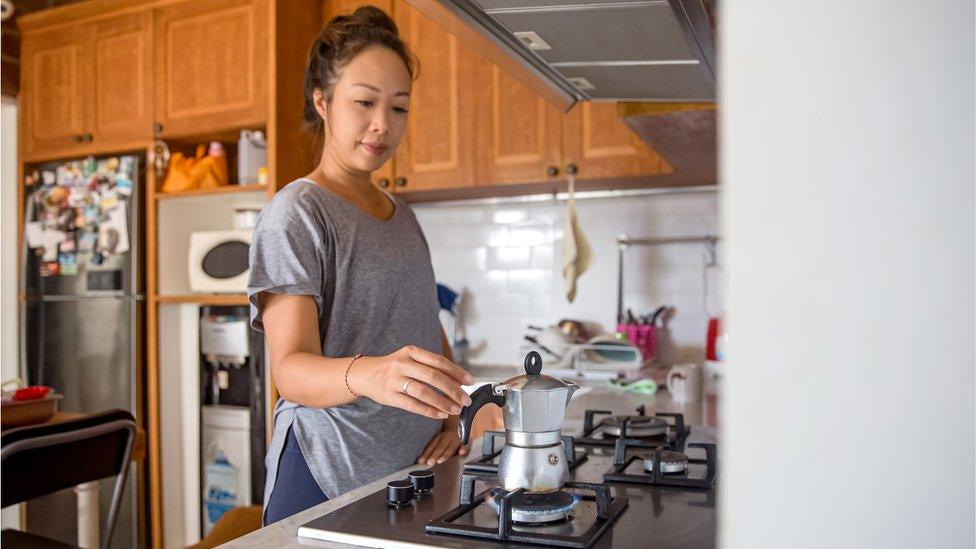Gas crisis: No chance lights will go out, says government
- Published
Kwasi Kwarteng: Talk of the lights going out is “alarmist, unhelpful and completely misguided"
There is "no question of the lights going out" this winter as a result of huge rises in gas prices, the business secretary has said.
Kwasi Kwarteng said he does "not expect supply emergencies" and described warnings about shortages as "alarmist".
His statement comes as smaller energy providers battle to stay afloat due to gas price hikes making price promises to customers undeliverable.
High demand for gas and reduced supply are behind a surge in wholesale prices.
Customers are protected from sudden hikes in wholesale gas prices through the energy price cap, which is the maximum price they can be charged on a standard tariff.
However, the cap means energy firms are unable to pass on higher wholesale costs to their customers, which is forcing some - mostly smaller companies - to go out of business.

So far, four energy firms have gone to the wall, and four more are expected to follow in the coming days. On Sunday, the UK's sixth largest energy company, Bulb, announced it is seeking a bailout.
The government has said it is considering offering emergency state-backed loans to surviving energy companies to encourage them to take on customers from bust firms.
Mr Kwarteng said the government would "not be bailing out failed companies" and said the sector had seen a "regular entry and exit" over the past five to 10 years.
"The current global situation may see more suppliers than usual exiting the market but this is not something that should be any cause for alarm or panic," he said.
"The taxpayer should not be expected to prop up companies which have poor business models and are not resilient to fluctuations in price."
The business secretary said the government wanted to protect customers from "price spikes" and that the energy industry should not return to the "cosy oligopoly" of years past where a few large suppliers "dictated to customers conditions and pricing".
At the beginning of 2021 there were 70 energy suppliers in the UK, but industry sources have said there may be as few as 10 left by the end of the year.
Mr Kwarteng added the UK benefited from having a "diverse range of gas supply sources" and had "more than sufficient capacity, to meet demand".
Shadow business secretary Ed Miliband warned that UK families were going to be hit by a "triple whammy" of tax rises, fuel costs and the end of the Universal Credit uplift this winter.
Higher bills
Industry group Oil & Gas UK has said wholesale prices for gas had increased by 250% since January - with a 70% rise since August.
The increase has been blamed on several factors, including a cold winter which left stocks lower than usual, high demand for liquefied natural gas from Asia, and lower supplies from other countries. Low winds meaning less renewable energy is being generated and outages at some nuclear stations have also contributed.
It has left some companies unable to provide their customers with the energy they have paid for.
However, if a supplier fails, energy regulator Ofgem will ensure supplies continue for affected households, and they will not lose money owed to them. A new energy supplier would be responsible for taking on any credit balances a customer may have, but consumers may end up on more expensive tariffs when they are switched.

Aside from gas prices driving up energy bills, millions of households in England, Wales and Scotland are already facing a 12% rise in their energy bills from October when a higher price cap comes into force.
Some of the largest energy companies have argued the current price cap on tariff - supported by both Labour and Conservative politicians - has helped trigger the current crisis.
"You can legislate to protect the consumer - but that can bankrupt the supplier," said one senior industry source.
However, Mr Kwarteng said the energy price cap was "not going anywhere".
Ofgem will review the price cap in February. There has been speculation that the energy regulator could lift the cap between now and next year to allow firms to charge customers more to cope with rising wholesale gas prices.

'I'm just watching the meter go up'

Stacey Stothard is waiting to see how much more she will have to pay
Stacey Stothard followed all the advice. Aware that energy prices were rising, she shopped around to find a decent fixed deal for her gas and electricity.
She saved £300 - or so she thought.
Her new energy supplier went bust and now she will be switched automatically to another one, and she is facing much higher bills, potentially amounting to hundreds of pounds more a year.
"It is just like watching the meter go up and up," she says. "I did the right thing - not going for the cheapest deal, but choosing a company with a decent customer service record."

Earlier on Tuesday, several smaller energy firms wrote an open letter sent to the prime minister, chancellor, business secretary and Ofgem, which stated they felt there "voice, as suppliers of all different sizes, has not been heard".
Signed by the likes of Green, AMPower, Neon Reef and Tru Energy, it called for a support package for all suppliers, a review of the price cap and for smaller firms to be included in future discussions on the future of the energy market.
It was critical of Ofgem, saying it was "currently unfit to regulate an industry they have appeared to have a vested interest in or turning a blind eye to the market returning to a selective monopoly and a reduction in competition".
In a joint statement on gas prices, Mr Kwarteng and Ofgem chief executive Jonathan Brearley reiterated that the current crisis was "not an issue of supply".
The pair said there was a consensus among energy suppliers and consumer groups that the "top priority" must be support for customers, "especially the elderly and vulnerable".
"In the event an energy supplier fails, we are committed that consumers face the least amount of disruption possible - and there are clear and well-established processes in place to ensuring this is the case," they added.
Knock-on effects
As a result of gas prices booming, energy intensive fertiliser producers have shut down, which has created a shortage of the by-product of production, carbon dioxide.
Food manufacturers and supermarkets have urged action because carbon dioxide is used to stun animals prior to slaughter and to keep food fresh for storage and transport.
Supermarket Iceland's managing director Richard Walker told the BBC the carbon dioxide shortage must be prioritised to limit any potential disruption for supermarket supplies, which are also being affected due to a shortage in HGV drivers in the UK, partly caused by the pandemic and Brexit.
Supermarket Ocado said it had "limited stock" of some frozen items due to gas shortages, while another supermarket told the BBC the situation was "escalating quickly".

What happens if your energy supplier goes bust?

Customers will still continue to receive gas or electricity even if the energy supplier goes bust. Ofgem will move your account to a new supplier but it may take a few weeks. Your new supplier should then contact you to explain what is happening with your account
While you wait to hear from your new supplier: check your current balance and - if possible - download any bills; take a photo of your meter reading
If you pay by direct debit, there is no need to cancel it straight away, Citizens Advice says. Wait until your new account is set up before you cancel it
If you are in credit, your money is protected and you'll be paid back. If you were in debt to the old supplier, you'll still have to pay the money back to your new supplier instead


FROM RAGS TO RICHES: The incredible and eventful life of one of the first actresses in comedy
HOW TO EAT WELL AT UNI: BBC Food's top tips for planning, shopping and keeping things tasty


How will you be affected by this? Email haveyoursay@bbc.co.uk, external.
Please include a contact number if you are willing to speak to a BBC journalist. You can also get in touch in the following ways:
WhatsApp: +44 7756 165803
Tweet: @BBC_HaveYourSay, external
Please read our terms & conditions and privacy policy
If you are reading this page and can't see the form you will need to visit the mobile version of the BBC website to submit your question or comment or you can email us at HaveYourSay@bbc.co.uk, external. Please include your name, age and location with any submission.
- Published20 September 2021

- Published19 September 2021

- Published18 September 2021

- Published19 September 2021
